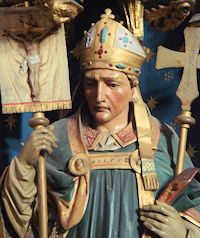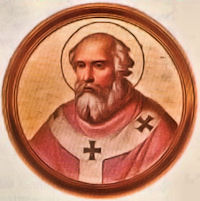Easter: April 19th
Friday of the Third Week of Easter
Other Commemorations: St. Leo IX, Pope (RM); St. Alphege, Archbishop and Martyr (RM)
» Enjoy our Liturgical Seasons series of e-books!
The Roman Martyrology commemorates Pope St. Leo IX (1002-1049), a cousin of the emperor Conrad the Salie, born in Alsace, and baptized Bruno. He was made bishop of Toul in 1026 and constrained to accept the papal office in 1048. He took his spiritual adviser, Hildebrand, the future Gregory VII, to Rome and began the reform of the Roman curia. Leo combated simony, condemned Berengarius, and strove to prevent the schism between the Eastern and the Western churches then being engineered by the emperor Michael Coerularius. While at Benevento, a city belonging to the Holy See, he was taken prisoner by the Normans. He was released, but shortly after died before the high altar in St. Peter's.
St. Alphege of Winchester (954-1012), also known as Elphege. Archbishop of Canterbury in 1006, he was imprisoned when the city fell for exhorting the pillaging Danes to desist from their murdering and looting. He refused to pay a ransom for his release and was put to death. He was the first archbishop of Canterbury to die a violent death, and St. Thomas Becket was praying for Saint Alphege’s intercession just before he was murdered.
Meditation for Friday of the Third Week of Easter
Resignation
”Be ye subject therefore to every human creature for God’s sake.” While the liturgy emphasizes the thought that we have no permanent abode in this world, it reminds us that we must adjust our lives to the plan which God made for us while we remain in this world. "Be ye subject therefore to every human creature for God's sake."
2. When St. Paul tells us that we are to be subject to every human creature for the love of God, he does not imply that we should close our eyes to injustice, selfishness, and evil. The emphasis placed on a return to social justice by recent popes makes the mind of the Church clear on this point. We do indeed live in a vale of tears, and we know that we can never expect perfection in this world, but we can and must work toward an improvement of conditions in the world about us. While it is not easy, as Pope Leo XIII pointed out in his encyclical on the condition of labor, to define the relative rights of the rich and the poor, there are nevertheless certain definite principles which truth and justice dictate in controlling our relationships with our fellow men. The solutions proposed by the various forms of socialism are not and cannot be accepted by the Church, because under the specious garb of humanitarianism, they are, as St. Paul tells us in the Epistle, "making liberty a cloak for malice," and are not based on the principles of liberty and justice. Many of those who propose plans for the betterment of living conditions, look upon man as merely a part of animal creation, forgetting that he has not only a right to a reasonable amount of comfort and happiness in this world, but also a duty to bear the cross so that he may earn an eternal reward for his labor. Speaking of these false socialistic theories, Pope Leo XIII says:
"What is of still greater importance, however is that the remedy they propose is manifestly against justice. For every man has by nature the right to possess property as his own. This is one of the chief points of distinction between man and the animal creation. For the brute has no power of self direction, but is governed by two chief instincts which keep his powers alert, move him to use his strength, and determine him to action without the power of choice" (Leo XIII, On the Condition of Labor).
Any plan for the improvement of the life of man on earth must learn to look upon men "as servants of God." The reformer and the social worker must first learn to "honor all men; love the brotherhood, and fear God." While St. Paul has great respect for authority and commands us to "honor the king as excelling, and the governors as sent by him for the punishment of evil doers," he does not deify the state. It is a pernicious mistake to suppose that the civil government has the right, at its own discretion, to penetrate and pervade the family and the home. While the civil government does have the responsibility for caring for the welfare of its citizens, it does not have the right to control and dictate how they should live, as is being done in so many of the welfare states of today.
The Church is not content with pointing out the errors of socialism; she points to the true remedy for social injustice and applies it to actual conditions. It is her right to teach men and to train them through the instructions of her bishops and priests. Through her teaching office she diffuses her salutary teachings far and wide. She strives to influence the minds and the hearts of men, so that they may willingly yield themselves to be formed and guided by the commandments of God. It is precisely in this fundamental matter that the Church has a power peculiar to herself. The agencies she employs for the improvement of human life in this world, are given her for the very purpose of reaching the hearts of men, by Jesus Christ Himself, and they derive their efficacy from God.
3. "Shout with joy to God all the earth." The earth ought to be a place of joy and happiness, especially now that our redemption has been accomplished. Man has been redeemed but he must allow himself to be regenerated through the grace of God. As long as men refuse to listen to the Church and refuse to apply the principles taught by Christ, there will continue to be social injustice, pain, and suffering in this world. It is futile to plan and establish world wide organizations for peace if we continue to ignore the will of the God of peace. Christ once stood on a mountain outside the City of Jerusalem and wept over it. In spite of all that He had done to turn it from its evil ways, it had been deaf to His pleading. He could foresee that the day would come when not a stone would be left upon a stone in that beautiful city, and that it would be destroyed for its wickedness. "If thou hadst known and that in this thy day, the things that are for thy peace; but now they are hidden from thy eyes" (Luke 19:42). So too, Christ must look down upon the world today, and upon that great temple we have built for the United Nations in our frantic search for peace and must say, "If thou hadst known the things that are for thy peace." All this elaborate equipment, all these detailed plans and negotiations are commendable, but it would be so much simpler if you would only learn to obey the Ten Commandments.
—Benedict Baur, OSB, The Light of the World, Vol. 2
Pope St. Leo IX
Before becoming Pope, St. Leo IX was known as Bruno. He was bitten by a poisonous reptile when a boy, but St. Benedict appeared to Bruno and cured him. In 1026, Bruno, then a deacon, commanded troops in Italy under the Emperor. The Bishop of Toul died during this time, and upon Bruno's return, he was made Bishop of Toul, where he remained for twenty years. After the death of Pope Damasus II in 1048, Bruno was elected to succeed him. As Pope, he denounced simony and began many needed reforms, traveling extensively to ensure their enforcement. For this reason he was given the title Peregrinus Apostolicus, Apostolic Pilgrim. St. Leo condemned the doctrines of Berengarius, who denied Transubstantiation. He increased the papal territory, though he was criticized by St. Peter Damian when he went to battle to defend it. He opposed the Patriarch of Constantinople, Michael Cerularius; this began the complete separation of Rome from the Eastern Church. Within 40 days of St. Leo's death, there were 70 cures through his intercession.
—Excerpted from Saints Calendar and Daily Planner by Tan Books
Patronage: musicians; Sessa Aurunca, Italy
Highlights and Things to Do:
- Read more about Pope St. Leo IX:
- See the Papal Documents from St. Leo XI.
St. Alphege
 St. Ælfheah or Alphege was born in the year 954, of a noble Saxon family. He first became a monk in the monastery of Deerhurst, near Tewkesbury, England, and afterwards lived as a hermit near Bath, where he founded a community under the rule of St. Benedict, and became its first abbot. (He is also referred to as Elphege, Alfege, or Godwine.)
St. Ælfheah or Alphege was born in the year 954, of a noble Saxon family. He first became a monk in the monastery of Deerhurst, near Tewkesbury, England, and afterwards lived as a hermit near Bath, where he founded a community under the rule of St. Benedict, and became its first abbot. (He is also referred to as Elphege, Alfege, or Godwine.)
At thirty years of age he was chosen Bishop of Winchester, and twenty-two years later he became Archbishop of Canterbury. In 1011, when the Danes landed in Kent and took the city of Canterbury, putting all to fire and sword, St. Alphege was captured and carried off in the expectation of a large ransom. He was unwilling that his ruined church and people should be put to such expense, and was kept in a loathsome prison at Greenwich for seven months.
While so confined some friends came and urged him to lay a tax upon his tenants to raise the sum demanded for his ransom. "What reward can I hope for," said he, "if I spend upon myself what belongs to the poor? Better give up to the poor what is ours, than take from them the little which is their own." As he still refused to give ransom, the enraged Danes fell upon him in a fury, beat him with the blunt sides of their weapons, and bruised him with stones until one, whom the Saint had baptized shortly before, put an end to his sufferings by the blow of an axe.
He died on Easter Saturday, April 19, 1012, his last words being a prayer for his murderers.
His body was first buried in St. Paul's, London, but was afterwards translated to Canterbury by King Canute. A church dedicated to St. Alphege still stands upon the place of his martyrdom at Greenwich.
—Excerpted from The Lives of the Saints, by Alban Butler, Benziger Bros. ed. [1894]
Symbols and Representation: bishop holding an axe; bishop with an axe in his head; bishop carrying stones in his chasuble
Patronage: Greenwich, England; kidnap victims; Solihull, England
Highlights and Things to Do:
- Read more about St. Alphege:
- Pray the Anglo-Saxon Prayer to St. Alphege.
- His remains are under the high altar at Canterbury Cathedral. There is a stained glass window depicting "The Life of Alphege," and the window is one of the earliest surviving windows at Canterbury. "The Siege of Canterbury" panel shows the city besieged by raiding Danes in 1011 with Archbishop Alphege taken hostage. When Alphege demanded the poor not to pay the ransom, the enraged Danes are said to have pelted him to death with ox bones. An eyewitness account of the event was probably known to the artist of this panel.








